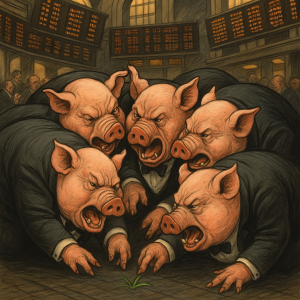✍️ Update & Accounting — July 2025
When this piece was first drafted in early 2025, we were responding to urgent headlines, leaked budgets, and credible projections. Now that some of the smoke has cleared, we’re revisiting key claims to see what held up—and what was walked back.
We believe transparency is not just an aesthetic but a commitment. Below is a factual review of the claims made, their current status, and what has (or hasn’t) changed.
| Claim | Original Statement | Updated Outcome | Notes |
|---|---|---|---|
| NIH Budget Cuts | 40% funding reduction | Proposed, but many cuts blocked in court | Rulings suspended or reversed key terminations |
| CDC Budget Cuts | ~50% funding loss | Proposal frozen by injunction | Layoffs halted; litigation pending |
| Tariffs on China | 145% on imports | Rolled back to ~30% | Significant negotiation impact |
| Grocery Costs | +$5,000/year | +$4,400 estimated | Directionally accurate, slightly overstated |
| Public Health Impact | Vulnerable populations at risk | Risk remains but funding partially restored | Concerns remain for FY26 cycles |
We stand by the core critique: economic logic that centers billionaire extraction continues to drive policy. But we also recognize where reality has moderated early alarm.
Courts still work (sometimes). Numbers still matter (usually). We’ll keep updating the receipts.
Recent headlines have underscored significant reductions in government support for scientific research, escalating international trade disputes, and policies prioritizing economic nationalism over the provision of social welfare services. These policy shifts are deeply influenced by an economic philosophy in which all resources, whether human, ecological, or cultural, are evaluated primarily for their economic potential and treated as commodities suitable for extraction, privatization, and monetization. This reductionist approach disregards the intrinsic value of people and the environment, framing every aspect of existence as a potential source of wealth accumulation.
Central to this critique is the question: Why do billionaires, and the economic structures they control, persistently link human value to productivity and economic output alone? Equally important is the inquiry into the prevailing assumption of private ownership: Why must every natural resource—from rivers and forests to agricultural lands and mineral deposits—be privately owned, exploited, and controlled by those with sufficient financial means?
Since the re-election of President Donald Trump on January 20, 2025, these questions have gained greater urgency. The administration has enacted substantial funding cuts affecting essential institutions, including the National Institutes of Health (NIH) and the Centers for Disease Control and Prevention (CDC). The NIH is confronting a drastic budget reduction of approximately 40%, significantly impairing its ability to conduct crucial biomedical research. Concurrently, the CDC has experienced nearly a 50% reduction in its budget, jeopardizing essential public health programs, particularly those serving vulnerable populations and children.
The implications of these cuts extend far beyond immediate financial savings. They threaten the viability of future scientific advancements, public health preparedness, and educational programs, constricting resources that are vital for fostering the intellectual and physical development of future generations. Moreover, escalating trade tensions—exemplified by the dramatic 145% tariff imposed on Chinese imports—have significantly increased consumer prices. These tariffs have resulted in an average annual increase of nearly $5,000 in grocery expenses per household, disproportionately affecting working-class and lower-income families. Such economic pressures diminish families’ capacities to create stable, nurturing environments, thereby directly impacting the well-being and future opportunities available to their children.
These economic developments point toward a deeper societal paradigm that values human life and the environment primarily through their ability to generate economic profit. Under billionaire-driven economic logic, resources or ecosystems not contributing directly to profit margins are seen as unproductive or wasted. This viewpoint neglects the intrinsic ecological value, biodiversity, cultural significance, and the plethora of community benefits these resources provide beyond mere financial considerations.
Confronting and addressing these systemic challenges requires a fundamental reevaluation of society’s assumptions about ownership, productivity, and value. It requires a critical assessment of the ethics underlying privatization and the emphasis placed on productivity as the ultimate measure of worth. Instead, a shift toward frameworks that emphasize human dignity, ecological preservation, community resilience, and sustainability is crucial.
Alternative economic paradigms, advocated by groups such as the Doughnut Economics Action Lab and the Design Justice Network, propose strategies grounded in sustainable practices, collective ownership, and environmental stewardship. These approaches argue for the recognition of inherent value in human life and ecological resources, independent of their direct contributions to economic productivity. By fostering equitable and sustainable economic structures, such initiatives aim to ensure long-term ecological health, social justice, and community well-being.
The future consequences of current economic and political decisions are profound, particularly for younger generations. The policy choices made today will significantly shape environmental stability, social equity, educational opportunities, and overall quality of life for future populations. Transitioning away from extractive billionaire-driven economic logic toward more holistic, equitable, and sustainable models is therefore essential—not merely from an ethical standpoint, but as a practical imperative for the health and continuity of society.
This transformation extends beyond theoretical discussions and requires tangible policy actions, broad societal engagement, and a commitment to reshaping foundational economic principles. Ultimately, redefining the metrics of value to encompass ecological integrity, communal welfare, and human dignity is vital for addressing contemporary social and environmental crises and securing a stable, fair future for all.


